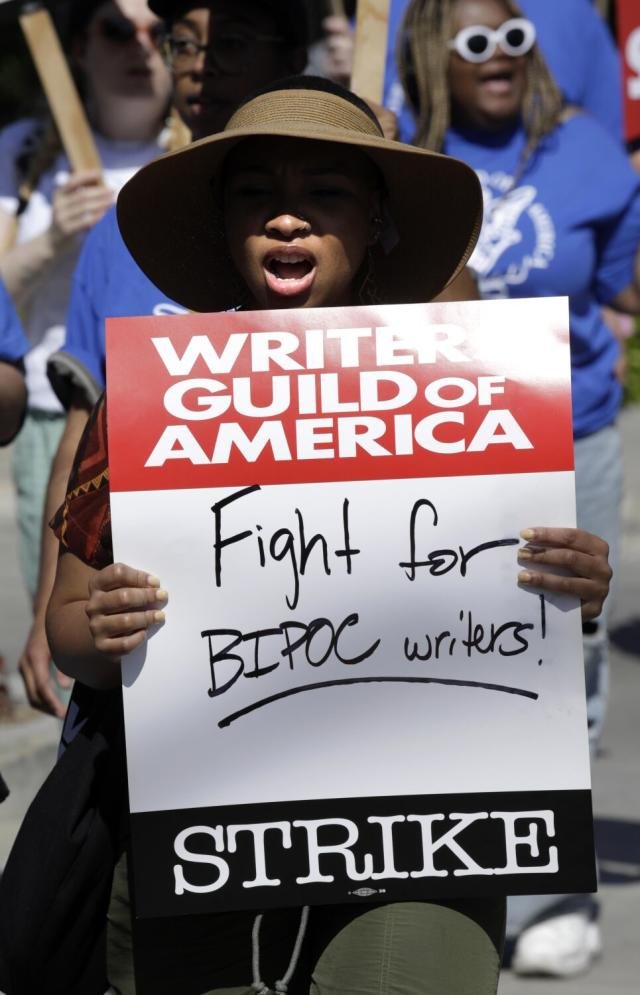OTV and the HOLLYWOOD STRIKES
OTV Integrity Board Member, Kyra Jones joins the picket line in front of Paramount Studios. (Genaro Molina / Los Angeles Times)
An Open Letter to the #OTVCommunity (and beyond)
Open Television (OTV) stands in solidarity with all workers fighting for respect and fair compensation for their labor. Writers and actors bring the stories of our times to the screen; they connect us to our humanity: our communities, histories,and cultures. For far too long, our world has exploited labor, especially the labor of communities marginalized by market and society because of their race, gender, sexuality, religion, disability and nationality. As a non-profit that advocates for intersectional artistry and is uniquely positioned in the film/TV industry, we realize the power we hold to repair our media landscape while also advocating for the cultivation of entirely new ones that are rooted in true equity. We believe that multiple truths can exist at once which is why we remain committed to building collective power that allows just pathways to be identified, activated and mobilized.
WHY THESE STRIKES ARE HAPPENING
We wholeheartedly support the strikes authorized by members of the Writers Guild of America and Screen Actors Guild-American Federation of Television and Radio Artists. These guilds emerged in the early-to-mid 20th century as acts of solidarity. Workers realized they needed to band together to counter the power of a small number of large corporations that have since dominated the film, television, and radio markets. Their members vote on rules that define acceptable practices for producing media, including rules on payments and benefits, crediting, working conditions, and more.
Unions exist to check the power of corporations, preventing them from over-exploiting the value of creative labor.
This has been a long time coming. For the past ten years, streaming has led to an exponential increase in the number of films and especially TV series released in the U.S. and globally (“peak TV”). As the number of projects has gone up, the quality of working conditions has gone down. Keeping costs low, media corporations reaped high profits and stock prices, making shareholders and top executives rich. This value was not shared with most writers and actors except the elite few.
OTV alums nevertheless benefited from increased demand for our stories. Dozens of writers, directors and actors who started their careers with OTV have worked with the biggest studios and platforms, supplying Hollywood with much needed diversity after decades of exclusion.
Yet over the years OTV artists have told us stories of how the culture of Hollywood still needs to change. It’s sad but unsurprising that the greatest increase in diversity in Hollywood has coincided with rapidly deteriorating labor conditions: less consistent work, shorter TV seasons, smaller payments over longer periods of time. We’ve also heard stories of hostility in the workplace, longer work hours, racism, misogyny, and other stress-inducing circumstances that contribute to the dismantling of a thriving, diverse media ecosystem fueled by nuanced storytelling.
We hope this strike reminds the studios that artists are the source of their wealth, and it needs to be shared equitably.
OTV’S RELATIONSHIP TO HOLLYWOOD AND UNIONS
At the same time, OTV will continue trying to build an alternative ecosystem more accountable to artists and the communities they serve. This is challenging as a Black, Queer and gender expansive led team with limited resources but vital if we’re to establish a continuum of care where intersectional storytellers are able to dream, create and thrive on their own terms.
We exist far outside the studio system as a non-profit streaming platform and media incubator. While our models resemble what is dominated in the mainstream distribution ecosystem, we release stories from artists who take it upon themselves to do the incredibly demanding work of writing, financing, and producing their own stories because corporations have excluded them. We don’t have access to produce everything that we release via the #OTVAPP, but we offer consultation and as much payment as we can for the right to distribute artists' stories non-exclusively.
Unlike the studios who spend billions to own and control artists, we exist to serve those who the studios marginalize. If Hollywood’s doors start to close, as has happened after previous strikes and as new technologies become old, we will still be here as a home exclusively for stories by and about people surviving multiple systems of oppression.
Our work helped diversify Hollywood, but we don’t seek liberation in any corporate system that values profit over people. When you subscribe to OTV, you are making an investment that we can have something outside Hollywood, a place where story matters more than profit and depth of community engagement matters more than size of audience.
As a society, we have more work to do to convince the public to support indie platforms. If more of us believed in our power outside of corporations, platforms like OTV would have the resources to pay creators enough so they can offer better working conditions than the studios who dominate the film/TV market. Currently most of our creators cannot afford to hire from unions or pay to be a part of unions. Most of which do not represent our communities because unions have been as exclusionary as the corporations they exist to check.
But we will never stop advocating for a more equitable media ecosystem that can heal and repair decades of harmful systems of oppression!
WHAT OTV IS LEARNING ABOUT HEALING HOW WE MAKE MEDIA
Supporting OTV generates knowledge on how to make media more healing. As a project that emerged out of a university, we take this very seriously. Over the years, we have published multiple studies on harm in media and how to repair it, including:
MMG & OTV. #LightsCameraHarm. 2023, https://www.weareo.tv/community/lightscameraharmreport
MADE Lab, OTV & IFA. Creativity and Wellness in the Chicago Film & Television Industry. 2022, https://www.madelab.org/research/the-health-of-chicago-film-tv
OTV, Strategic Vision 2022-2025, https://www.weareo.tv/development/strategicvision-2023-2025
You can also read the many research reports and annual reports we have published since our founding to see how we have stayed in conversation with our artists and community members about the challenges they are facing, the innovations they are creating, and their views about our work:
OTV Development Reports, https://www.weareo.tv/development
OTV Research Reports, https://weareo.tv/research
For a wider view of the relationship between platforms like OTV and Hollywood, you can read OTV’s Co-Founder and Board Treasurer, Dr, Aymar Jean Christian’s first book,Open TV: Innovation Beyond Hollywood and the Rise of Web Television(NYU Press, 2018), which formed the intellectual justification for starting OTV. Reparative Media: Cultivating Stories and Platforms to Heal Out Culture(MIT Press, forthcoming), Christian’s forthcoming book that uses the early years of OTV to show what is possible when we band together as artists and community members to create the media we want to see. Both of these books are, at their core, a critique of power and a case for community-based ways of making.
HOW TO SUPPORT THE STRIKE
We encourage you to support the strikes in whatever ways you are able, but one way to support a fairer media ecosystem is to support platforms like OTV with your dollars and by sharing our work with your friends. Realize your resources and move with intention.
If you are a WGA or SAG-AFTRA members, the guilds have published rules and guidelines for navigating the strike:
WGA 2023 Strike Rules: https://www.wgacontract2023.org/strike/strike-rules
SAG-AFTRA 2023 Strike Rules: https://www.sagaftra.org/files/sa_documents/Strike%20Notice%20to%20Members.pdf
If you are a film/TV viewer, SAG-AFTRA and the WGA are not recommending you cancel your subscription or stop watching their stories in theaters or on these corporate platforms (and neither are we!). Your viewership shows the value of writer/actor labor! This is especially important in the coming age of AI, which threatens to automate all labor.
For OTV artists, most of the rules allow for you to write and produce your own work so long as it is for you or an indie/non-profit company like OTV and not for a strike company as represented by the AMPTP, which represents the major corporate studios. During the last WGA strike from 2007-2008, writers and actors banded together to create their own online network, Strike TV, and produced hundreds of short-form stories. This type of collective power is chronicled in Open TV: Innovation Beyond Hollywood and the Rise of Web Television and serves as one of many inspirations for OTV’s pursuit to build collective power amongst independent storytellers!
This is an opportunity to cultivate an ecosystem outside of corporate power!
We are, and will always be, all that we need.
OTV Evolutionary Governing Body & Leadership Team
Yvonne Welbon, Board President
Dr. Aymar Jean “AJ” Christian, Co-Founder and Board Treasurer
Elijah McKinnon, Co-Founder and Executive Director
Sarah Minnie, Head of Artist Development + Production
Chris Walker, Head of Marketing and Exhibition

